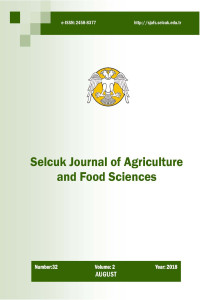Öz
Ustilago maydis (DC) Corda, the causal agent of maize smut disease, can form enormous galls on cobs and cause significant yield losses under favorable conditions. In addition to yield losses, U. maydis may have an influence on the kernel quality in smutted cobs. The aim of this study was to determine presence of mycoflora on the cobs infected by U. maydis. A 2-year field experiment was conducted in Antalya Province. In the study, some maize cultivars belonging to various maize variety groups including dent corn, flint corn, sweet corn and popcorn were used as host plants. Inoculations were performed by injecting inoculum into ear silk of each cob of the plants in inoculated plots. For each treatment, control plots were also set up. When the kernels of cobs in control plots were mature enough to harvest, kernel samples in inoculated plots were taken from smutted cobs and investigated in terms of fungal flora. A total of 6 genera (Paecilomyces, Aspergillus, Penicillium, Acremonium, Fusarium, Rhizopus) were detected from the kernels in the smutted cobs. However, frequently isolated species were Aspergillus fumigatus, A. niger, A. parasiticus(A. flavus), Paecilomyces lilacinus, Penicillium citrinum, Fusarium solani, F. oxysporum and Rhizopus stolonifer. The most frequently isolated genus was Aspergillus (31.4%), while the lowest one was Penicillium (6.4%). The study showed that U. maydis may affect kernel quality of maize by harboring some fungal microorganisms in smutted cobs.
Anahtar Kelimeler
Ayrıntılar
| Birincil Dil | İngilizce |
|---|---|
| Konular | Bitki Bilimi |
| Bölüm | Araştırma Makalesi |
| Yazarlar | |
| Yayımlanma Tarihi | 29 Ağustos 2018 |
| Gönderilme Tarihi | 20 Nisan 2018 |
| Yayımlandığı Sayı | Yıl 2018 Cilt: 32 Sayı: 2 |
Selcuk Journal of Agriculture and Food Sciences Creative Commons Atıf-GayriTicari 4.0 Uluslararası Lisansı (CC BY NC) ile lisanslanmıştır.


